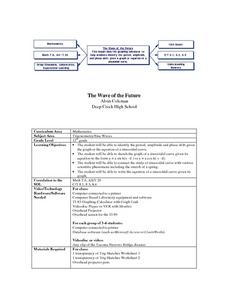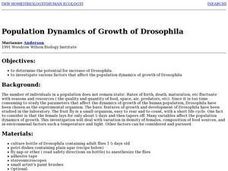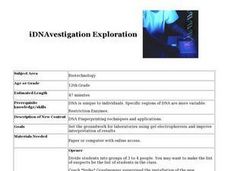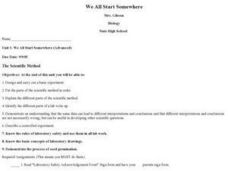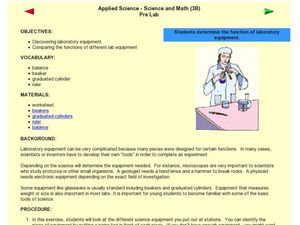Curated OER
The Wave of the Future
Twelfth graders discuss sine curves and enter equations into their graphing calculator then compare different graphs created on their calculators. They identify the period, amplitude and phase shift given the graph or the equation of a...
Curated OER
Microbial Contaminants in Drinking Water
When presented with three unopened bottles of water, students are asked to tell decide which one is contaminated with a microbe. Students work in small groups and role play being a Microbiologist, a patient, or a recorder. The patient is...
Curated OER
Which Wrap Is Wrapped Right?
Students investigate the integrity and strength of different types of food wraps. They test the wraps and create a graphic organizer for the data. Once it is organized then a lab report can be written. The instructional activity contains...
Curated OER
Population Dynamics of Growth of Drosophila
Students experiment with Drosophila to determine if density of female flies, food sources, temperature and light affect the population dynamics of growth. Students graph their data and compare their results to the number of human...
Curated OER
Population Dynamics of Growth of Drosophila
Students investigate population dynamics such as variation in density of females, composition of food sources an environmental factors such as light and temperature on Drosophila. They then relate their findings to human populations and...
Curated OER
Robert Boyle and Oxford
Learners investigate seventeenth century sources that reveal why Oxford became an outstanding centre of science during Boyle's residence. They write a summary of the information found on Oxford and Robert Boyle's accomplishments.
Curated OER
Powdery Mildew Fungi: Classification and Ecology
Students use a written key or illustrated key to identify fungi on plant leaves into its genus based on sexual or asexual reproduction, host range diversity, and host-parasite relationships.
Curated OER
Genetic Counseling
Learners apply the principles of ethical decision making to actual cases. They appreciate that there is usually no one "right" decision. Students compare their conclusions to those of individuals who are in the field.
Curated OER
Activity #17 Liquid Density and Temperature
Students comprehend that hot water rises up through cold water but cold water does not rixe in hot water. They comprehend that water at temperatures above 4oC decreases in density with increases in temperature. Students answer lab...
Curated OER
iDNAvestigation Exploration
Young scholars investigate DNA Fingerprinting techniques and applications. They participate in a scenario to analyze blood to discover who shattered a plexiglass backboards. In addition, they explain why the DNA fingerprint of blood from...
Curated OER
Moon, Mars, and Beyond-Mission Briefing
Young scholars complete this introductory lesson in which they find out about the scenario for a simulated online space mission. They review vocabulary and complete a review sheet to reinforce the details of the mission and its goals.
Curated OER
We All Start Somewhere
Students demonstrate an understanding that the same data can lead to different interpretations and conclusions and that different interpretations and conclusions are not necessarily wrong, but can be useful in developing other scientific...
Curated OER
Acid Rain Experiments
Students define the term acid rain, and the causes of acid rain. They locate regions where acid rain is most affected, and what can students deduce from maps of geology and soils in New York State. Students answer the questions why are...
Curated OER
Polymerase Chain Reaction and DNA Profiling
Students examine DNA fingerprinting and polymerase chain reaction and how they are used in everyday life and for criminal investigations. They discover how these techniques can also be used to answer ecological and evolutionary questions.
Curated OER
ESL Advanced Reading Comprehension
In this advanced ESL reading comprehension activity, students read a detailed article about a couple who sues a TV company. Kids then answer 7 true/false questions. This is most appropriate for adult ESL students.
Curated OER
Trace Evidence
In this trace evidence learning exercise, students use the websites on the forensic science page of the kid zone at http://sciencespot.net/ to complete the fill in the blank questions on the learning exercise.
Curated OER
Simple Machines
Learners discover that simple machines reduce the effort required in a task. In this simple machines lesson students see demonstrations of simple machines.
Curated OER
The Physical Setting
Tenth graders examine chemical reactions. In this chemistry lesson students choose an investigation that they wish to perform based on their interest.
Curated OER
Flame Test
Students conduct a flame test on different substances. In this chemistry lesson, students predict the element present based on the color emitted during the flame test. They explain how different elements produce different colors.
Curated OER
You say Avocado, I say Avogadro
Students convert mole to mass to particles and vice versa. In this chemistry lesson, students discuss the importance of Avogadro's number. They apply what they have learned in a team competition.
Curated OER
Applied Science -- Science and Math (3B) Pre Lab
Set up stations around your science lab to introduce youngsters to different equipment. They examine a beaker, graduated cylinder, ruler, balance, and thermometer. The said worksheet is not included, but you will find a few useful tips...


